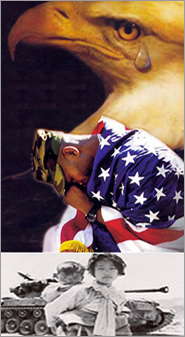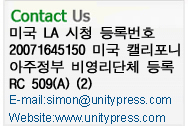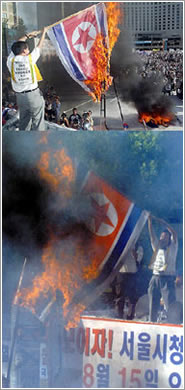1. 2007년 5월 3일 2차 항소심 판결문 (2002년 6월 한인회장 불법 당선자 하 기환 케이스) 1차 항소심 판결문과 1차 1심 판결문은 아래에 있음.
(여기서 주목할 '현상'은......원고인 미주통일신문 대표가 승소할 때는(1심 1차)판결문이 4장으로 간단하다. 또, 판사의 사인이 명확하게 되어 있다는 것. 그러나 패소할 때는 판사들이
* 판결문에 판사 사인도 하지 않고,
* 사인했다는 원본 판사 사인을 공개할 수 없다고 하고,
* 판사가 사인한 판결문을 외부에 공개하면 안된다고 하고,
* 판사 사인을 한 판결문을 원고인에게 전달하지 않고,
* 판결문 윗장에는 [판례로 남길 수 없다]고 적어놓고,
* 또 패소 판결문은 4장이 아닌 11장에 이른다는 사실....
* 더욱 주목할 현상은, 최소한 7일 내 판결해야 할 주법 위반 재판을 1년 이상 핑퐁을 친다는 사실이다. 서기-판사들의 언동도 시간대 별로 달라진다. 원고인이 증거를 제시해도 고려하지도 않고... 증언,. 진술도 들은 후 못들은 척 한다. 웃기는 미국 재판이다. 무슨 사연이 있었길래....)
다음 판결문... 2차 항소심 판결문. 2003년 12월 1차 항소심 때의 판사들이다. 원고인이 실수했다. 판사교체 신청을 하지 않은 것이. 교체 해 본들 소용 없었지만. 대법원에서 끝장을 낸다.
Appellant, v. KOREAN AMERICAN FEDERATION OF LOS court did not err in granting judgment in fav SIMON BAE, Plaintiff and ANGELES et al., Defendants and Respondents.
B186395
COURT OF APPEAL OF CALIFORNIA, SECOND APPELLATE DISTRICT, DIVISION THREE
2007 Cal. App. Unpub. LEXIS 3609
May 3, 2007, Filed
PRIOR HISTORY: APPEAL from a judgment of the Superior Court of Los Angeles County, No. BC275912. Kenneth R. Freeman, Judge.
DISPOSITION: Affirmed.
COUNSEL: Simon Bae, in pro. per., for Plaintiff and Appellant.
Henry M. Lee Law Corporation and Henry M. Lee for Defendants and Respondents.
JUDGES: ALDRICH, J.; KLEIN, P.J., KITCHING, J. concurred.
OPINION BY: ALDRICH
OPINION:
INTRODUCTION
This case involves a dispute as to whether the bylaws of defendant and respondent the Korean American Federation of Los Angeles (KAFLA) were properly amended in 2000. If so, the president (defendant and respondent Kee Whan Ha, hereinafter Ha) properly sought reelection and became president for a second term. Plaintiff and appellant Simon Bae (Bae) brought this case challenging the election and Ha's presidency. We affirm the trial court's judgment in which it concluded that Bae had not met his [*2] burden of proof.
FACTUAL AND PROCEDURAL BACKGROUND
1. Factual background. n1
n1 Following the usual standard of review, we construe all disputed facts in favor of the judgment. (Reichardt v. Hoffman (1997) 52 Cal.App.4th 754, 766; Escamilla v. California Dept. of Corrections & Rehabilitation (2006) 141 Cal.App.4th 498, 514.)
KAFLA's predecessor organization was formed in 1962. In 1982, KAFLA became an incorpo-rated non-profit corporation. Articles of incorporation were filed at that time. As a non-profit cor-poration KAFLA is governed by California Corporations Code section 5100 et seq.
The mission of KAFLA is to promote the rights and interests of the Korean American commu-nity and to further cultural exchange and friendly relations between the Korean American commu-nity and the mainstream society. KAFLA provides a number of services and organizes a number of activities, including providing information to new immigrants.
The original bylaws of 1982 provided that [*3] the "Board of Directors shall deliberate and resolve the following: [P] 1. Matters to amend or enact the Baylaws [sic], Regulations Governing Elections, and other regulations[.]"
In 1984, 1995, 1997, 1998, and 1999, KAFLA's bylaws were amended. n2 Each time, the amendments were passed by a vote of the board of directors.
n2 Most of KAFLA's records have been lost.
KAFLA's bylaws are written in Korean. All of its operations, such as meetings and the text of its minutes, are conducted in Korean. In the ordinary course of its business, KAFLA does not main-tain an English translation of its bylaws. KAFLA's 1999 bylaws, which are the focus of the dispute, were written in Korean and translated into English for purposes of this litigation. The 1999 bylaws provided that the president could only serve one term.
The 1999 bylaws provided for two types of membership: "regular" and "honorary." All Korean Americans over the age of 18 residing in Los Angeles County were automatically KAFLA "regular members," by [*4] virtue of their ethnicity, and had a right to vote. It was estimated that there were 600,000 Korean Americans living in Los Angeles County, 300,000 of whom were over the age of 18. "Honorary members" were all non-Koreans who supported KAFLA's objectives.
KAFLA set up a process to register voters. This was done to minimize the risk that members would vote more than once in the presidential election. Member's names were placed on a master list, and crossed off when the person voted.
Ha was elected president in April 2000, by a vote of the community.
a. The amendments to the 1999 bylaws.
Soon after Ha took office, Grace Han (Han) was selected as chair of a bylaws revision commit-tee. Thereafter, the committee proposed 41 changes to the bylaws and election procedures. One proposal was to permit the president to seek a second term.
On June 6, 2000, Han notified the 43 KAFLA directors that the regularly scheduled board meeting would take place on June 12, 2000. The notice also included a list of the proposed changes.
Half of the board had to be present for a quorum. To amend the bylaws, the resolution had to pass by two-thirds vote. On June 12, 2000, 26 of the board members were [*5] present for the meeting. Thirty-nine directors voted to permit KAFLA's presidents to seek a second term. Of the directors who voted for the proposal, 26 were present at the meeting and 13 voted by proxy or ab-sentee ballot. The proposal passed as more than two-thirds of the directors voted for it.
b. The 2002 election.
Ha was the sole, unopposed, candidate for election in 2002. He was installed as KAFLA's president in June 2002.
2. The original trial court proceedings.
a. The complaint and initial proceedings.
On June 17, 2002, the day before Ha was reinstalled as president, Bae filed this lawsuit seeking to remove Ha from office and to obtain a new election. Bae sought a temporary and permanent in-junction. n3 The crux of Bae's complaint was that KAFLA's board improperly amended the 1999 bylaws to permit Ha to run for a second term. Bae alleged the amendment was improper because the "1999 By-laws unequivocally states that the revision of the By-laws shall require favorable votes from two thirds of the registered members[, and not two thirds vote of the board]." (Italics added.) KAFLA and Ha were named as defendants and appear on appeal as respondents. b. [*6] The first trial.
n3 Although other plaintiffs originally were named in the complaint, only Bae continues to pursue this litigation.
The case proceeded to a court trial. The parties agreed that according to KAFLA's 1999 bylaws, the president could not seek reelection. The major issued addressed was whether the amendment to the 1999 bylaws permitting Ha to run for reelection had to be approved by the board or by the reg-istered members. If, as Bae argued, the "registered members" had to approve a change to the 1999 bylaws, then Ha's second term had to be voided.
The 1999 bylaws were translated for this litigation. Bae's English translation was contained in Exhibit 1. The declaration of the translator stated that 24 pages were translated from Korean to Eng-lish. However, the attached document in Korean was only four pages. The interpreter's declaration indicated that the title of the original document was "Agreement, Bylaws, and Election Administra-tion Rules." However, the title of the translation was [*7] only "Bylaws." The translation had a cover page, although the original did not.
According to Exhibit 1, the key provision was contained in Article 21 of the 1999 bylaws. Bae's English translation of this key provision was that "All meetings of [KAFLA] shall be effective with the presence of a majority of the members, and all the decisions shall be made by [a] majority vote. However, revision of the Bylaws shall require favorable votes from two thirds of the registered members." (Italics added.)
Article 21 is in a chapter of the bylaws entitled "Meetings." Article 20 delineates the types of KAFLA meetings. Exhibit 1 (the translation provided by Bae) and Exhibit 2 (Bae's translation of the 2000 bylaws) listed the four different types of meetings as "annual meeting," n4 "regular direc-tors meeting," "temporary directors meeting," and "operational meeting." Exhibit 14 (the translation submitted by KAFLA and Ha) listed these meetings as "biannual meeting," n5 "regular board meeting," "special board meeting," and "executive meeting."
n4 In Exhibit 1, "annual meeting" was defined as "The Annual Meeting shall be called by the new President every two years between April 1 and April 20 to examine and resolve im-portant matters, including revision of the Bylaws and the Election Administration Rules, or-ganization of the Chairman's Group, a decision on the Board of Directors fee, and examina-tion of the business plan and budget."
[*8]
n5 Exhibit 14 defined the "biannual meeting" as follows: "The newly elected President shall convene a meeting either on April 1st or on 20th every other year to discuss and resolve amendments of the bylaws and election regulations, the Board member composition, the membership due[s], business plan, budget analysis and other important issues."
Exhibit 14 defined "regular board meeting" as "The Chairperson shall convene a meeting once a month to discuss and resolve important issues."
KAFLA and Ha argued that the 1999 bylaws permitted amendments by a two-thirds vote of the board of directors, as had been done throughout the history of the organization. KAFLA and Ha noted that even though there might have been a process to register voters, there was no such thing as a "registered member" and that given the size of the organization it was impractical and unrealistic to interpret the bylaws to require a vote of the membership to amend the bylaws.
In Exhibit 14, the translation of the bylaws submitted by KAFLA and Ha, Article 21, read: "The quorum for any meeting shall require more than half [*9] present and resolutions are passed by majority vote. Amendments of bylaws shall require more than two-third (2/3) of those registered." Another translation submitted by KAFLA and Ha of the 1999 bylaws translated the key provision as: "The quorum to call the meetings to order shall be the majority attendance. Decisions are made by plurality. Amending the bylaws shall require 2/3 votes." n6
n6 The second English translation of the 1999 bylaws was done by Young S. Suh. (Ex-hibit 85.) Suh's declaration was not admitted into evidence.
KAFLA and Ha contended that the board had to approve bylaw amendments because there were no meetings of the membership, but only board meetings. They also contended that when Article 21 referred to a "meeting," by necessity it referred to a meeting of the board as described in Article 20, which only defined board meetings. KAFLA and Ha noted that even though Exhibit 1 referred to an "annual meeting" it defined such meetings as being held "every two years." (See fn. 4.)
c. The decision [*10] in the first trial.
A court trial was held in January 2003. Thereafter, the trial court entered a judgment in favor of Bae and "Members of the Korean American Federation of Los Angeles, Inc., similarly situated." The trial court held that (1) the 1999 bylaws could not be amended without votes from two-thirds of the registered members; (2) the 1999 bylaws had not been validly amended to permit the president to seek a second term; and (3) Ha could not have properly sought reelection.
The trial court issued a permanent injunction restraining Ha from acting as KAFLA's president and directing Ha to surrender immediately all KAFLA properties. The judgment also included a di-rective to KAFLA to "immediately conduct an election for the KAFLA presidency."
d. Postjudgment proceedings.
On February 20, 2003, KAFLA and Ha filed a motion for new trial in the trial court on the basis that they had discovered the original 1982 KAFLA bylaws which were in English. The 1982 bylaws provided that the president may serve for two terms and the board had the power to amend the by-laws. The trial court did not consider the new trial motion, concluding it had lost jurisdiction to rule on it because [*11] a notice of appeal had been filed on January 17, 2003.
e. The first appellate proceedings.
Bae filed in this court a petition for writ of mandate (B168943) contending the injunction was merely prohibitory and therefore the judgment was not automatically stayed on appeal. Bae sought immediate enforcement of the injunction to preclude Ha from being KAFLA's president pending appeal. Bae also asked that we immediately decide the matter. We deemed the petition for writ of mandate and the application for order shortening time for hearing together as a motion to expedite the appeal.
In an opinion filed on March 10, 2004, in Case No. B164472, we held that the trial court erred because it had jurisdiction to consider the new trial motion. We also held that the trial court's refusal to hear the new trial motion was prejudicial because the newly discovered document warranted a new trial. We concluded that the 1982 bylaws were significant because the trial court had placed great weight on the fact that it did not know what was contained in that document, the original 1982 bylaws would have aided in understanding the past practices of KAFLA, and that if the amend-ments to the 1999 bylaws [*12] had been done improperly, other amendments might also have been invalid, and thus the 1982 bylaws might have controlled the election.
In Case No. B164472, we also stated that the 1982 bylaws had additional significance in light of evidentiary errors: "Exhibit 1 (Bae's translation of the 1999 bylaws) was erroneously admitted into evidence as no foundation was laid to demonstrate its reliability. No interpreter's certification ac-companied Exhibit 1. Further, the copy of Exhibit 1 that had been attached to Bae's complaint was accompanied by a certification that was not trustworthy. As KAFLA and Ha contend, and as Bae concedes by not presenting a contrary argument on appeal, this document was erroneously admitted. [P] Bae's entire case probably would have crumbled had Exhibit 1 not been admitted. This was the translation used by Bae to support his position that amendments to the bylaws should have been made by a vote of the 'registered members.' Exhibit 1 was relied upon extensively by the trial court to support its conclusion that bylaw amendments were to be made by 'registered members.' The trial court stated in the statement of decision, 'Exhibit 1 leave[s] no room for any other [*13] interpre-tation: Revision of the Bylaws shall require favorable votes from two thirds of the registered mem-bers.' (Original emphasis.)" (Case No. B164472, supra, [at p. 12].)
We additionally held the trial court erred in admitting irrelevant testimony that had "permitted Bae to besmirch Ha's reputation. Given that Ha was the only witness presented on his and KAFLA's behalf, this error was significant." (Case No. B164472, supra, [at p. 12].)
We reversed and remanded to the trial court. n7
n7 We also declined to impose sanctions upon Bae.
3. The proceedings on remand.
a. The second trial.
On June 30, 2004, Ha's term as KAFLA's president expired.
On remand the case was assigned to the Honorable Kenneth R. Freeman.
KAFLA and Ha moved to dismiss the case on the grounds that Ha already had stepped down as president. The trial court denied the motion because a single unresolved issue remained: whether KAFLA's bylaws were properly amended in 2000.
The parties stipulated that the case [*14] would be tried by declaration. The trial court ordered the parties to file briefs limited to the single unresolved issue, but informed the parties that they had a right to call witnesses, if notice of such was given prior to the hearing.
The parties submitted briefing. When the case came for hearing, neither party sought to call witnesses. The arguments by the parties tracked those that had been argued in the first trial:
(1) Bae contended that a two-thirds majority of the "registered members" was required to amend the bylaws. Bae submitted Exhibit 1, which was the identical translation and certification he had submitted in the first trial. Additional


| 사용자 | |
| 비밀 | |






















